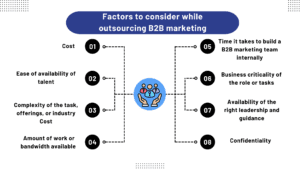This article was originally published in the Elevate Your Marketing newsletter and has been repurposed and republished here with the author’s permission. Here is the link to the original article.
The ‘build vs buy’ decision is always a dilemma in almost every industry and business function. And this holds true for B2B marketing as well. When you are building the foundation of your business, even the smallest of decisions make a difference. Hence, it is important to carefully analyze the pros and cons of outsourcing your marketing efforts.
Today, we do a deep dive into the 8 key factors you need to take into account while outsourcing anything in marketing.
Factors to consider while outsourcing B2B marketing
The following are the factors you need to analyze to choose between building every marketing function in-house and outsourcing some of them.

Factors to consider while outsourcing B2B marketing
- Cost.
- Ease of availability of talent.
- The complexity of the task, offerings, or industry.
- Amount of work or bandwidth available.
- The time it takes to build a team internally.
- Business criticality of the role or tasks.
- Availability of the right leadership and guidance.
- Confidentiality.
Let us delve into the details of each a bit.
1. Cost
This doesn’t need any explanation. Outsourcing can sometimes hurt your balance sheet. Let us take an example to understand this better.
In India, you can hire a skilled video editor cum graphic designer at a cost of about INR 60000 (roughly $800) per month (or even lesser). Assume he/she completes the following tasks in a month:
- 3 videos.
- 15 banners (including social media, website, etc).
- 2 brochures.
- 1 ebook.
- 1 case study document.
For the same amount of designs to be done by a freelancer or agency, you will end up spending a minimum of INR 200000 (roughly $2600).
However, if you are doing it in-house, you will incur additional costs for elements like tools, voice-over artists (for videos), background music, stock images, etc. In addition, outsourcing can help things rolling pretty much from day 1 while hiring a new resource takes at least 2 months. So, you also need to take into account the opportunity cost.
In short, outsourcing can be beneficial in the short run. Building an in-house team for cost advantages is more of a long-term strategy.
Related: Do B2B Marketing Under $60K a Year!!
2. Ease of availability of talent
Finding the right talent is not easy. Some roles are more difficult to find talent for than others.
For instance, it’s slightly easier to find designers than to find good content strategists. That’s what my experience tells me. The same applies to email marketing. Everyone knows how to write an email. But how many come with the knowledge of writing emails that can potentially generate business? Not a lot for sure.
In short, if you are struggling to find the right candidate for a marketing role, do either of the two:
- Finetune your talent-hunting process.
- Or outsource the job to a freelancer or agency.
3. Complexity of the task, offerings, or industry
This refers to how easy or difficult it is for an external party to understand your business. Maybe your business or industry is so niche that it takes time for an external party to convert that into effective marketing. It could also be that your products or services are not easy to understand. Another possibility is that the task itself is complex or sensitive that you wouldn’t want to outsource it (an example of this would be any marketing focused on existing customers).
In all these scenarios, you might want to think twice before delegating your marketing activities to an agency or freelancer. Read this with the other 7 factors mentioned in this article before you take a call.
However, if you are able to find agencies who can act like your extended marketing team by thoroughly understanding your business, that can work in your favor. For instance, at Skalegrow, we specialize in helping embedded systems companies (like robotics companies for example) apply various marketing tactics because we understand the industry pretty well. So you can consider hiring an external party if you are able to find the right fit.
4. Amount of work or bandwidth available
If your internal resources are facing a bandwidth crunch and need a helping hand, consider outsourcing at least a portion of your work.
5. Time it takes to build a B2B marketing team internally.
Building a good team internally is time-consuming. It takes weeks or sometimes months to find the right candidates. The interview process takes a few more weeks. Then you need to wait for another 8-12 weeks for the candidate to complete his/her notice period.
This means that it can take you as long as 6 months to 1 year to build a solid B2B marketing team. And training them and bringing them to speed might take another 2-3 months. Your business can’t wait that long to start seeing some marketing action happen. In such a scenario, you can consider outsourcing some of your work to an external party.
However, if there are ways in which you can shorten the hiring cycle (say finding immediate joiners, candidates through inter-departmental transfer, etc), go for building an internal team.
Also read: How to structure a lean B2B marketing team if you are tight on budget
6. Business criticality of the role or tasks
This goes without saying. As much as possible, try to keep business-critical tasks within your span of control by having somebody internal work on them.
7. Availability of the right leadership and guidance.
This is one of the most overlooked factors when it comes to building any team, not just a marketing team. A ship needs a captain. Similarly, a team needs a leader. Someone who can:
- Guide the team members in the right direction.
- Take the right decisions at the right time.
- Motivate the team members to work towards individual and team goals.
- Mentor them to help them learn and grow.
Without the right leader, you will find it hard to retain people. So until you have somebody at the top to handhold the team, you better go for the outsourcing model.
On the other hand, outsourcing requires you to have the right person on your side to coordinate and work alongside the agency or freelancer. I have seen many agency engagements becoming a disaster when there is nobody on the business side to travel along.
8. Confidentiality
Having an NDA (Non-disclosure agreement) in place protects you from any probable data breach in theory. But if outsourcing means sharing data that you really do not want the outside world to know, better build the marketing function in-house.
Final thoughts on outsourcing B2B marketing
One thing to note here is that not any factor should be read in isolation. And many a time, a ‘one size fits all’ approach might not work. Just because outsourcing marketing works for one company (even if it’s in the same industry), it doesn’t mean that it works for your business. Every business is unique. Always make sure to evaluate all the 8 factors and your business environment before taking a call.
Skalegrow – B2B marketing agency
Skalegrow is a B2B marketing agency aimed at making life better for marketing leaders and founders in the B2B space. It was founded to address two key challenges in the B2B world:
- The lack of quality of services offered by marketing agencies
- The misalignment of marketing activities with organizational level goals
By introducing a consultative approach to offering marketing services, Skalegrow strives to make growth simpler and predictable for B2B companies. From content marketing to video marketing and email marketing, we offer a complete suite of marketing services to the IT, SaaS, tech, and embedded systems industries. If you are looking for help in implementing marketing tactics that work, please write to us at info@skalegrow.com.
About the author

Naseef KPO is the Founder and CEO of Skalegrow. He comes with rich experience across multiple areas of B2B marketing including content marketing, demand generation, SEO, account-based marketing, marketing analytics, revenue attribution, marketing technology, etc. He writes thought-provoking and relevant articles on The Skalegrow Blog and his weekly LinkedIn newsletter Elevate Your Marketing.
Prior to starting Skalegrow, Naseef led large marketing teams in multi-million dollar B2B organizations where he made significant contributions to the topline growth of the business. He has also appeared on numerous podcasts where he shared his thoughts on trending marketing topics such as the application of AI in marketing, startup marketing, ABM, and B2B content marketing, just to name a few. Being the founder of Skalegrow, he is currently focusing on helping its clients stay ahead of their competition by using innovative yet practical marketing tactics.
You can connect with Naseef KPO on LinkedIn.


